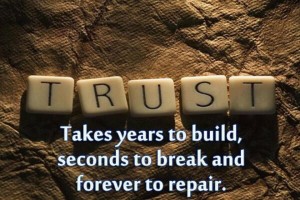 Developing trust is important for relationships to be healthy, positive and productive. Be it in a family, marriage, friendship, organization or community. Trust is to relationships what motor oil is to your car’s engine. If you allow your car to run out of oil, you will not go far before the friction causes it to burn up your engine, ultimately seizing up: the fix – a new engine! Building a culture of trust will help to continue forward progress, be more fulfilling and more productive. This is especially true in your spiritual life, I wrote about this at length in my book Life Palette.
Developing trust is important for relationships to be healthy, positive and productive. Be it in a family, marriage, friendship, organization or community. Trust is to relationships what motor oil is to your car’s engine. If you allow your car to run out of oil, you will not go far before the friction causes it to burn up your engine, ultimately seizing up: the fix – a new engine! Building a culture of trust will help to continue forward progress, be more fulfilling and more productive. This is especially true in your spiritual life, I wrote about this at length in my book Life Palette.
“Love is patient and kind. Love is not jealous or boastful or proud or rude. It does not demand its own way. It is not irritable, and it keeps no record of being wronged. It does not rejoice about injustice but rejoices whenever the truth wins out. Love never gives up, never loses faith, is always hopeful, and endures through every circumstance.” (1 Cor 13:4-7 NLT)
Trust takes years to build, seconds to break and forever to repair. To continue to grow and be healthy in your relationships, trust is imperative. Here are some tools for helping you develop and maintain a culture of trust in your organization and relationships:
1. Make A Commitment To Open Communication
When writing that down it seems right, living it out can be a little harder to do. You have to develop a systematic approach to assure that you live in open communication. For instance in a marriage, make sure you have a least a once a month time you have set aside to clear the air. A few simple questions will help you get on and stay on track. On a scale of 1 – 7 (7 being the highest) sit together and let each other rate where you feel you are relationally in the area of:
- Passion (Physical/sexual relationship)
- Intimacy (emotional closeness)
- Spiritually (Is Jesus at the center of your relationship)
Then talk about why each of you feels like you are where you say you are, what are the differences and how you can grow closer to having 7’s in all 3 areas for both of you.
In an organization a simple tool or process will help to stay on course as well. For me and my staff we have a simple 5 step process for conflict resolution. To make sure we are not holding back on this we make it an agenda item on our weekly meetings – again to keep the air clear and to build trust.
2. Do What You Say You Will Do
In other words, keep your word. Nothing will erode trust quicker than saying you will do something and not doing it. The other person is counting on you and will base their trust in you on whether or not you keep your word. You may have the habit of over committing, if so, this is an area you will need to work on. The Psalmist wrote “who may worship in your sanctuary, Lord?…those who keep promises even when it hurts.” (Psalm 15:1-4 NLT) Have those close to you hold you accountable in this area. If you find you have over committed, you can guard the trust you’ve built with someone by simply letting them know that you have done so and give them a more realistic plan or deadline – your honesty will build trust. However you still need to learn to say “no” so that you can do what you say you will do.
3. Be Loyal
Loyalty is valued in every relationship and will build or rebuild trust. Loyalty is not simply saying the right things, but doing the right things as well. Those you have relationships with or are working with need to know you have their back, that you have their best in mind. We have all experienced loyalty. Consider what it takes to rebuild trust in the person who has been disloyal to you. While forgiveness can be immediate, when trust is broken with disloyalty it will take a long time to rebuild. When disloyalty is habitual you will eventually get to a place in a relationship that you may never get the opportunity to rebuild trust.
Building a culture of trust can take time. Continue to live out these 3 tools and you will discover that in most cases, it won’t take as long as you think.
Next Steps To Build Trust:
Jesus says in Luke 6:31: “Do to others as you would have them do to you.” Naturally, you would want people to choose to trust you rather than be suspicious of you. So make these 3 commitments in your most important relationships:

